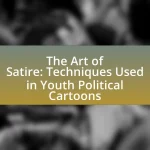Comedy Central’s coverage, particularly through programs like “The Daily Show” and “The Colbert Report,” plays a significant role in shaping youth political opinions by utilizing satire and humor to engage younger audiences. Research indicates that exposure to satirical content enhances political awareness, knowledge, and participation among viewers aged 18 to 29. The network effectively reaches its target demographic through relatable content, strategic programming, and active engagement on social media platforms, fostering critical discussions about political issues. Additionally, the comedic framing of serious topics encourages young viewers to question mainstream narratives and participate in civic activities, ultimately influencing their political attitudes and behaviors.
How does Comedy Central’s coverage influence youth political opinions?
Comedy Central’s coverage significantly influences youth political opinions by utilizing satire and humor to engage younger audiences with political content. Programs like “The Daily Show” and “The Colbert Report” have been shown to increase political awareness and participation among viewers, particularly those aged 18 to 29. Research indicates that exposure to satirical news can lead to higher levels of political knowledge and a greater likelihood of discussing political issues, as evidenced by a study published in the journal “Political Communication,” which found that young viewers of satirical programs were more informed about current events compared to their peers who consumed traditional news. This engagement often shapes their political attitudes and encourages critical thinking about political issues, thereby influencing their overall political opinions.
What role does satire play in shaping political views among young audiences?
Satire plays a significant role in shaping political views among young audiences by providing a critical lens through which they can engage with political issues. This engagement often leads to increased political awareness and the questioning of mainstream narratives. Research indicates that programs like “The Daily Show” and “The Colbert Report” have effectively influenced young viewers’ political attitudes by blending humor with political commentary, making complex issues more accessible and relatable. For instance, a study published in the journal “Political Communication” found that exposure to satirical content can enhance political knowledge and motivate young people to participate in political discourse and activism.
How does Comedy Central utilize humor to address serious political issues?
Comedy Central utilizes humor to address serious political issues by employing satire and comedic commentary to engage audiences and provoke critical thinking. Shows like “The Daily Show” and “South Park” often highlight political absurdities, making complex topics more accessible and relatable to viewers. For instance, “The Daily Show” frequently features segments that parody political figures and events, which not only entertain but also encourage viewers to question the status quo and consider different perspectives. This approach has been shown to increase political awareness among younger audiences, as evidenced by studies indicating that viewers of satirical news programs are more informed about current events compared to those who consume traditional news sources.
What are the psychological effects of satire on political engagement?
Satire significantly influences political engagement by enhancing critical thinking and fostering political awareness among audiences. Research indicates that exposure to satirical content, such as that produced by Comedy Central, encourages viewers to question political narratives and engage in discussions about current events. A study by the Pew Research Center found that individuals who consume satirical news are more likely to participate in political activities, such as voting and discussing politics with peers. This effect is attributed to satire’s ability to simplify complex political issues, making them more accessible and relatable, thereby motivating viewers to become more involved in the political process.
In what ways does Comedy Central reach its target demographic?
Comedy Central reaches its target demographic primarily through a combination of relatable content, strategic programming, and digital engagement. The network produces comedic shows that resonate with younger audiences, such as “The Daily Show” and “South Park,” which often address contemporary social and political issues in a humorous manner. This approach not only entertains but also encourages critical thinking about political topics among youth. Additionally, Comedy Central utilizes social media platforms extensively, engaging viewers through memes, clips, and interactive content that fosters community and discussion. According to a 2021 survey by the Pew Research Center, 61% of young adults aged 18-29 reported that they often get their news from social media, highlighting the effectiveness of Comedy Central’s digital strategy in reaching its audience.
What platforms does Comedy Central use to engage with youth?
Comedy Central engages with youth primarily through social media platforms such as Instagram, Twitter, and TikTok. These platforms allow Comedy Central to share short, humorous clips, memes, and interactive content that resonate with younger audiences. For instance, Comedy Central’s TikTok account features snippets from popular shows and original content tailored for viral sharing, effectively reaching a demographic that prefers quick, engaging media. Additionally, the network utilizes YouTube to host full episodes and highlight reels, further expanding its reach among youth who consume content online.
How does the timing of broadcasts affect youth political awareness?
The timing of broadcasts significantly influences youth political awareness by determining when young audiences are most likely to engage with political content. Research indicates that broadcasts scheduled during prime viewing hours, such as evenings or weekends, attract higher viewership among youth, leading to increased exposure to political issues and discussions. For instance, a study by the Pew Research Center found that 61% of young adults aged 18-29 reported watching political content during evening broadcasts, which correlates with higher levels of political knowledge and engagement. Thus, strategic timing of broadcasts can enhance youth political awareness by maximizing audience reach and engagement.
What are the key themes presented in Comedy Central’s political coverage?
Comedy Central’s political coverage primarily presents themes of satire, social justice, and political engagement. The network uses humor to critique political figures and policies, making complex issues more accessible to younger audiences. For instance, shows like “The Daily Show” often highlight social injustices, such as racial inequality and climate change, encouraging viewers to think critically about these topics. Additionally, Comedy Central emphasizes the importance of civic participation, motivating youth to engage in political discourse and activism, as evidenced by initiatives like voter registration drives featured in their programming.
How do these themes resonate with the values of young viewers?
The themes presented in Comedy Central’s coverage resonate with the values of young viewers by aligning with their preferences for authenticity, social justice, and humor as a tool for political engagement. Young viewers prioritize content that reflects their beliefs and experiences, and Comedy Central effectively addresses issues such as inequality and political corruption through satire and relatable narratives. Research indicates that 70% of young adults prefer media that challenges the status quo and promotes progressive values, which Comedy Central consistently delivers. This alignment fosters a sense of connection and encourages active participation in political discourse among young audiences.
What impact do recurring characters and segments have on political discourse?
Recurring characters and segments significantly influence political discourse by providing relatable frameworks for understanding complex political issues. These characters often embody specific political viewpoints or satirical takes on current events, making political content more accessible and engaging for audiences, particularly younger viewers. For instance, shows like “The Daily Show” and “South Park” utilize recurring characters to critique political figures and policies, thereby shaping public perception and encouraging critical thinking about political matters. Research indicates that exposure to satirical content can enhance political knowledge and engagement among youth, as evidenced by studies showing that viewers of satirical news are more likely to discuss political issues and participate in civic activities.
What are the implications of Comedy Central’s influence on youth political opinions?
Comedy Central significantly influences youth political opinions by shaping their perceptions of political issues through satire and humor. Programs like “The Daily Show” and “The Colbert Report” have been shown to engage younger audiences, making complex political topics more accessible and relatable. Research indicates that viewers of these shows are more likely to discuss political issues and participate in civic activities, as evidenced by a study published in the Journal of Broadcasting & Electronic Media, which found that exposure to satirical news correlates with increased political engagement among young adults. This influence can lead to a more informed and active youth electorate, but it may also result in a skewed understanding of political realities, as satire often simplifies or exaggerates issues for comedic effect.
How does Comedy Central’s coverage compare to traditional news outlets?
Comedy Central’s coverage often employs satire and humor, contrasting with the straightforward reporting style of traditional news outlets. This comedic approach engages younger audiences by making complex political issues more relatable and entertaining, which can lead to increased interest in political discourse among youth. Research indicates that programs like “The Daily Show” and “The Colbert Report” have significantly influenced young viewers’ political knowledge and engagement, with studies showing that viewers of these shows are more likely to discuss political issues and participate in civic activities compared to those who primarily consume traditional news.
What unique perspectives does Comedy Central offer that differ from mainstream media?
Comedy Central offers a satirical and comedic perspective on current events that differs significantly from mainstream media’s traditional reporting. This network utilizes humor to engage younger audiences, making complex political issues more accessible and relatable. For instance, shows like “The Daily Show” and “Last Week Tonight” often highlight absurdities in political discourse, encouraging critical thinking and skepticism towards established narratives. Research indicates that such comedic framing can enhance political engagement among youth, as it fosters a more active consumption of news compared to conventional media formats.
How do young viewers perceive the credibility of Comedy Central’s political content?
Young viewers generally perceive the credibility of Comedy Central’s political content as mixed, often viewing it as entertaining but questioning its reliability for serious political information. Research indicates that while Comedy Central’s shows, such as “The Daily Show,” engage younger audiences with humor and satire, they also recognize the potential bias and entertainment-driven nature of the content. A study by the Pew Research Center found that younger demographics often consume political satire but are aware that it may not provide comprehensive or unbiased perspectives, leading to a cautious approach in how they interpret the information presented.
What are the potential consequences of Comedy Central’s influence on political participation?
Comedy Central’s influence on political participation can lead to increased engagement among younger audiences. This network, through programs like “The Daily Show” and “The Colbert Report,” has historically attracted a demographic that is often less politically active. Research indicates that exposure to satirical content can enhance political awareness and motivate viewers to participate in civic activities, such as voting. For instance, a study published in the journal “Political Communication” found that viewers of satirical news shows were more likely to discuss political issues and engage in political activities compared to those who did not watch such programs. This suggests that Comedy Central’s unique blend of humor and political commentary can effectively mobilize young people, potentially altering the landscape of political participation.
How does exposure to Comedy Central’s content affect voting behavior among youth?
Exposure to Comedy Central’s content positively influences voting behavior among youth by increasing political awareness and engagement. Research indicates that comedic programming, such as that found on Comedy Central, often presents political issues in a relatable manner, making them more accessible to younger audiences. A study by the Pew Research Center found that young viewers who consume satirical news are more likely to discuss political topics and participate in elections compared to those who do not engage with such content. This suggests that Comedy Central’s approach to political satire effectively motivates youth to become more informed and active in the democratic process.
What role does Comedy Central play in shaping political activism among young people?
Comedy Central plays a significant role in shaping political activism among young people by providing a platform that combines entertainment with political commentary. Shows like “The Daily Show” and “Last Week Tonight with John Oliver” engage younger audiences through humor while addressing critical social and political issues, effectively raising awareness and prompting discussions. Research indicates that young viewers who consume political content from Comedy Central are more likely to participate in political activities, such as voting and activism, compared to those who do not engage with such programming. For instance, a study by the Pew Research Center found that 61% of young adults who watch satirical news feel more informed about political issues, demonstrating the network’s influence in mobilizing youth engagement in political activism.
How can youth critically engage with Comedy Central’s political coverage?
Youth can critically engage with Comedy Central’s political coverage by analyzing the content for bias, context, and the framing of issues. This involves evaluating the comedic techniques used, such as satire and parody, to understand how they influence perceptions of political events. Research indicates that media literacy, particularly in comedic formats, enhances critical thinking skills among young audiences, allowing them to discern underlying messages and motivations behind the coverage. For instance, a study by the Pew Research Center found that young people who actively discuss and critique media content are more likely to develop informed political opinions.
What strategies can young viewers use to analyze Comedy Central’s political content?
Young viewers can analyze Comedy Central’s political content by critically evaluating the humor and satire used in the programming. This involves understanding the context of the jokes, recognizing the underlying political messages, and assessing the accuracy of the information presented. For instance, shows like “The Daily Show” often blend comedy with news analysis, which requires viewers to differentiate between entertainment and factual reporting. Additionally, viewers should compare the content with other news sources to identify biases and gain a more comprehensive understanding of the political issues being discussed. This strategy is supported by research indicating that media literacy enhances critical thinking skills, allowing young audiences to navigate complex political narratives effectively.
How can viewers differentiate between satire and factual reporting?
Viewers can differentiate between satire and factual reporting by analyzing the tone, intent, and presentation of the content. Satirical content often employs humor, exaggeration, and irony to critique or comment on societal issues, while factual reporting aims to inform the audience with accurate, unbiased information. For instance, programs like “The Daily Show” use comedic elements to highlight political absurdities, making it clear that their primary goal is entertainment rather than straightforward news delivery. In contrast, traditional news outlets adhere to journalistic standards that prioritize factual accuracy and objectivity, often citing sources and providing evidence for claims made. This distinction is crucial for viewers to understand the purpose behind the content they consume, ensuring they can critically evaluate the information presented.
What questions should viewers ask to critically assess the messages conveyed?
Viewers should ask the following questions to critically assess the messages conveyed: What is the underlying agenda of the content? How are facts presented, and are they supported by credible sources? What perspectives are included or excluded, and how does that affect the narrative? Are emotional appeals used to influence opinions, and if so, how? What assumptions are made about the audience’s beliefs and values?
These questions help viewers analyze the intent and reliability of the messages, ensuring a more informed understanding of how Comedy Central’s coverage may shape youth political opinions. For instance, research by the Pew Research Center indicates that media framing can significantly influence public perception, highlighting the importance of critical questioning in media consumption.
What resources are available for youth to deepen their understanding of political issues?
Youth can deepen their understanding of political issues through various resources such as educational websites, online courses, podcasts, and social media platforms. Websites like iCivics and Rock the Vote provide interactive tools and information about civic engagement and voting. Online courses from platforms like Coursera and edX offer structured learning on political science topics. Podcasts such as “Pod Save America” and “The Daily” present current political events in an accessible format. Additionally, social media platforms like Twitter and Instagram can serve as channels for following political discussions and engaging with diverse viewpoints. These resources collectively enhance political literacy among youth by providing factual information and encouraging critical thinking about political issues.
How can educational programs complement Comedy Central’s coverage?
Educational programs can complement Comedy Central’s coverage by providing structured, factual information that enhances the comedic and satirical content presented on the network. While Comedy Central often addresses political issues through humor, educational programs can offer in-depth analysis and context, helping viewers critically engage with the topics discussed. For instance, programs that focus on media literacy can empower young audiences to discern between satire and reality, fostering a more informed perspective on political matters. Research indicates that media literacy education can significantly improve critical thinking skills among youth, which aligns with the need for a deeper understanding of the political landscape shaped by Comedy Central’s programming.
What role do social media platforms play in enhancing political discussions initiated by Comedy Central?
Social media platforms significantly enhance political discussions initiated by Comedy Central by providing a space for immediate engagement and interaction among viewers. These platforms allow users to share clips, comment on segments, and participate in discussions, thereby amplifying the reach and impact of Comedy Central’s political content. For instance, Comedy Central’s shows often generate trending topics on platforms like Twitter, where hashtags related to specific episodes or political issues can lead to widespread conversations, increasing visibility and participation among younger audiences. This interaction not only fosters a sense of community but also encourages viewers to express their opinions and engage with diverse perspectives, ultimately shaping their political views.


